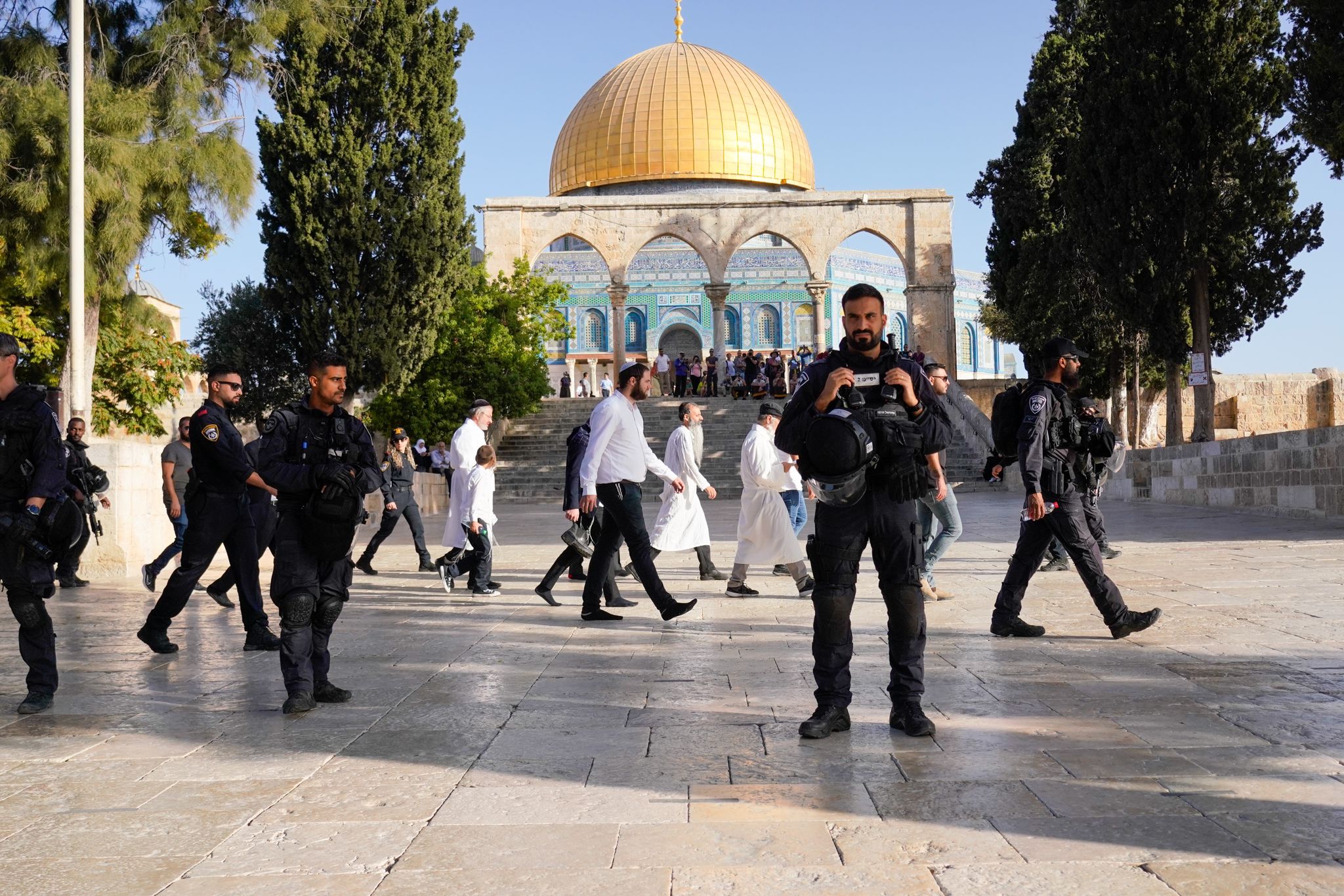More than 200 Palestinians have been killed by Israel since the start of the year, per figures shared by Palestine’s health ministry.
Qatar has condemned the storming of Al-Aqsa Mosque on Sunday by settlers and said it holds Israel “solely responsible” for escalations triggered by the latest Israeli provocation.
“Qatar strongly condemns the storming of the courtyards of the blessed Al-Aqsa Mosque by hundreds of settlers, under the protection of the Israeli occupation forces, considering it a flagrant violation of international law and international legitimacy resolutions,” Doha’s foreign ministry said in a statement.
The Gulf state stressed “the attempts to prejudice the religious and historical status of Al-Aqsa Mosque” are deemed an attack on Palestinians and the global population of millions of Muslims.
Qatar further warned of potential cycles of violence and escalations on the ground, slamming Israel’s “systematic escalation policy” against Palestinians.
“The Ministry of Foreign Affairs holds the Israeli occupation authorities solely responsible for the cycle of violence that will result from this systematic escalation policy against the Palestinian people and their lands and holy sites, urging the international community to take urgent action to stop these attacks,” the statement added.
The Qatari foreign ministry concluded the statement by reiterating its “firm stance” regarding the Palestinian cause and highlighting its support for “the legitimate rights of the fraternal Palestinian people, including the full right to practice their religious rituals without restrictions”.
On Sunday, hundreds of Israeli settlers stormed the courtyards of the Al-Aqsa Mosque in Jerusalem for the Jewish holiday of Yom Kippur. Israeli Knesset member Yehuda Glick led the raid into the holy site under heavy protection from Israeli occupation forces (IOF).
Such violations are frequent under Israel’s system of apartheid as well as its wider attempts at changing the status quo of holy Muslim and Christian sites by judaising them.
The IOF blocked a number of roads in Jerusalem for the Jewisj holiday, preventing Palestinians from entering the mosque until Monday evening, per a report by Palestine’s Wafa news agency.
Many Palestinian businesses were also affected by the closure of the streets.
“Local sources reported that the occupation police completely closed the entrances to a number of neighbourhoods with cement cubes to prevent the movement of vehicles, and prevented citizens from moving around,” Wafa added.
Sources on the ground informed Wafa that a number of Palestinians were subjected to violence by the IOF in the vicinity of the Al-Aqsa mosque to clear the way for illegal settlers.
Intensified attacks
Since the start of the year, Israel has intensified its attacks on Palestinians in the West Bank and Gaza, carrying out deadly military raids across both areas.
Also on Sunday, Israeli occupation warplanes bombed a site east of the Bureij refugee camp in the besieged Gaza Strip, though no casualties were reported.
The attack came after more than a week of border protests in the besieged enclave against Israel’s ongoing occupation, to which the IOF responded by firing live bullets.
Analysts have drawn links between the recent protests and similar demonstrations in 2018 and 2019, widely known as the ‘Great March of Return’, during which the IOF killed more than 350 Palestinians.
Meanwhile, Qatar and Egypt have reportedly been attempting to prevent new escalations in Gaza by holding talks with Palestinians and Israelis, a Palestinian official privy to the matter told Reuters last week.
Cairo, which shares diplomatic ties with Tel Aviv, and Doha—the host of Hamas’ political office—have been at the forefront of de-escalation efforts in the Gaza Strip.
Both parties have mediated a number of ceasefires that have brought to an end numerous Israeli bombardments of the city in recent years.
Gaza was subjected to a deadly Israeli bombing campaign between 8 to 13 May, in which the IOF killed 33 Palestinians, including children. The five-day brutal aggression ended following intensive discussions between Qatar, Egypt and the United Nations.
This year has already been the deadliest for Palestinians since 2006, when the UN began counting deaths. More than 200 Palestinians have been killed by Israel since the start of the year, per figures shared by Palestine’s health ministry.
Last week, Qatar’s Amir Sheikh Tamim bin Hamad Al Thani dedicated a large portion of his speech before the UN General Assembly to highlight the need to end Israel’s occupation of Palestine.
“If we truthfully constitute an international community, and not a merely diverse entities, it must be our duty to strive towards ending the injustice afflicting them, at least in accordance with what is required by the resolutions of this body, and entailed by international law,” Amir Tamim told world powers at the UN.
Sheikh Tamim added that “it is not acceptable for the Palestinian people to remain prisoners of the Israeli settler occupation arbitrariness.”
“You have to bear in mind that the failure of the international organisation to take actions against the occupation provided and continues to provide the opportunity for Israel to undermine the foundations of the two-state solution by means of settlement expansion until the occupation has brazenly taken the form of an apartheid regime in the broad daylight of the twenty-first century,” the Qatari leader noted.







